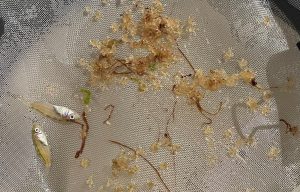Expert panel convened to review OAH modeling tools

An independent panel of scientific experts has been convened to review a set of modeling tools that predicts the ecological consequences of intensifying ocean acidification and hypoxia (OAH) in California coastal waters and the degree to which land-based activities are influencing this trajectory.
The six-member expert panel, which will begin meeting in December, is tasked with quantifying the level of uncertainty associated with the coastal OAH modeling tools’ predictions, as well as weighing in on what additional steps are needed to improve management confidence in the modeling work.
The modeling tools – which consist of a coastal ocean water-quality model and associated biological interpretation tools – were developed by a research team that includes SCCWRP, the University of California, Los Angeles, Princeton University, and the National Oceanic and Atmospheric Administration’s Pacific Marine Environmental Laboratory.
The expert review panel was put together over the past few months by the National Water Research Institute, which formed a steering committee made up of project stakeholders to ensure the expert review process is fair and transparent. SCCWRP’s role in this process is limited to serving as one of two ex officio science advisors to the steering committee.
Independent, transparent review of the managerial relevance of the OAH modeling tools is critical as coastal ocean managers weigh how much confidence to place in the tools’ predictive abilities. For example, the State Water Resources Control Board is considering whether to financially incentivize water-quality managers to invest in removing nutrients from wastewater discharges; the modeling work is expected to be one line of evidence that helps inform these deliberations.
The coastal ocean model is made up of two component models – collectively known as ROMS-BEC (Regional Ocean Modeling System-Biogeochemical Elemental Cycling) – that work in tandem to predict the influence that local nutrient discharges are having on coastal ocean health. Excess nutrients are being introduced to the coastal ocean via wastewater effluent discharges, stormwater runoff and atmospheric deposition.
The modeling work is part of a West Coast-wide initiative to help managers understand which marine habitats are most vulnerable to a change in seawater chemistry known as ocean acidification, plus the related phenomenon of hypoxia, or low dissolved oxygen levels.
To ensure that stakeholders can trust the expert panel’s findings, NWRI established an intentionally transparent and balanced process for selecting panelists. Steering committee members agreed at the upfront on the selection criteria and desired expertise for panelists. Furthermore, any committee member had power to unilaterally veto any of the panelist candidates that NWRI put forward.
More than 50 candidates were nominated and vetted by NWRI. The panelists have expertise in areas including physical and biogeochemical oceanography, biological effects of low oxygen and pH levels, and model application to support management decisions.
The six panelists selected represent the unanimous consensus of the steering committee:
- Dr. Neil Banas, University of Strathclyde
- Dr. Fei Chai, University of Maine
- Dr. Marjorie Friedrichs, Virginia Institute of Marine Science
- Dr. Alexander Kurapov, National Oceanic and Atmospheric Administration
- Dr. Mike Stukel, Florida State University
- Dr. Weifang (Gordon) Zhang, Woods Hole Oceanographic Institution
During the expert panel’s first two meetings – which will be held virtually on December 12, 2023 and January 9, 2024 – panelists will be introduced to the charge questions developed by the stakeholder committee, the modeling tools themselves, and stakeholders’ key questions and concerns about this body of work.

The expert panel will meet for its first in-person meeting on January 17-18, 2024 in the Orange County area, at a location to be determined. The panel’s deliberations are expected to last about 18 months.
All meetings will be webcast and will be fully accessible to the public, except when the panel is in closed session.
For more information, contact Dr. Martha Sutula and Dr. Faycal Kessouri.
More news related to: Climate Change, Ocean Acidification and Hypoxia, Top News